
| Programme (taught in English) | 4-year full-time degree programme in AI with information and computing technology, and interdisciplinary applications with Catholic values taught by caring staff with diverse expertise and passion |
| Career | AI graduates are highly in demand globally in many different professions. Employment and postgraduate study opportunities are abundant in whatever city one may move to |
| Apply for admission | successful completion of high school education in a 12-grade school system more |
| English proficieny | more |
| Professionals | IT professionals (already had degree) to study AI or apply for Year 3 entry more |
| International student information | tuition/scholarship, visa, travel, hostel/accommodation |
| Exchange student program | Optional |
| Internship | Optional |



Extraordinarily promising opportunities with new technologies such as machine learning, multimedia, virtual reality, Augmented Reality and cloud solutions and others, which continues to reshape AI space and enhance digital entertainment technologies (DET) beyond the current practices. AI and DET now play leading roles in the academia, industry, commerce, healthcare, education, management, government, smart city.
Benefits to pursue AI degree programme:
Our AI Programme is taught by caring staff with diverse expertise and passion to nurture high-tech professionals to serve the society with dignity of the individual, morality, and family values.
Staff:

The gifts of human intelligence have enabled many innovations and tools in AI, IT, and design that continues to improve and affect human lives tremendously. Yet these powerful tools may also be misused such as in addiction, in pornography, in the culture of death, and in fierce competitions to prosper at the expense of defeating others. Authentic Catholic teaching encourages to live out Christian faith of love, care and helping each other in the use of high-tech in one's profession in life in serving other people and the common good of the society.

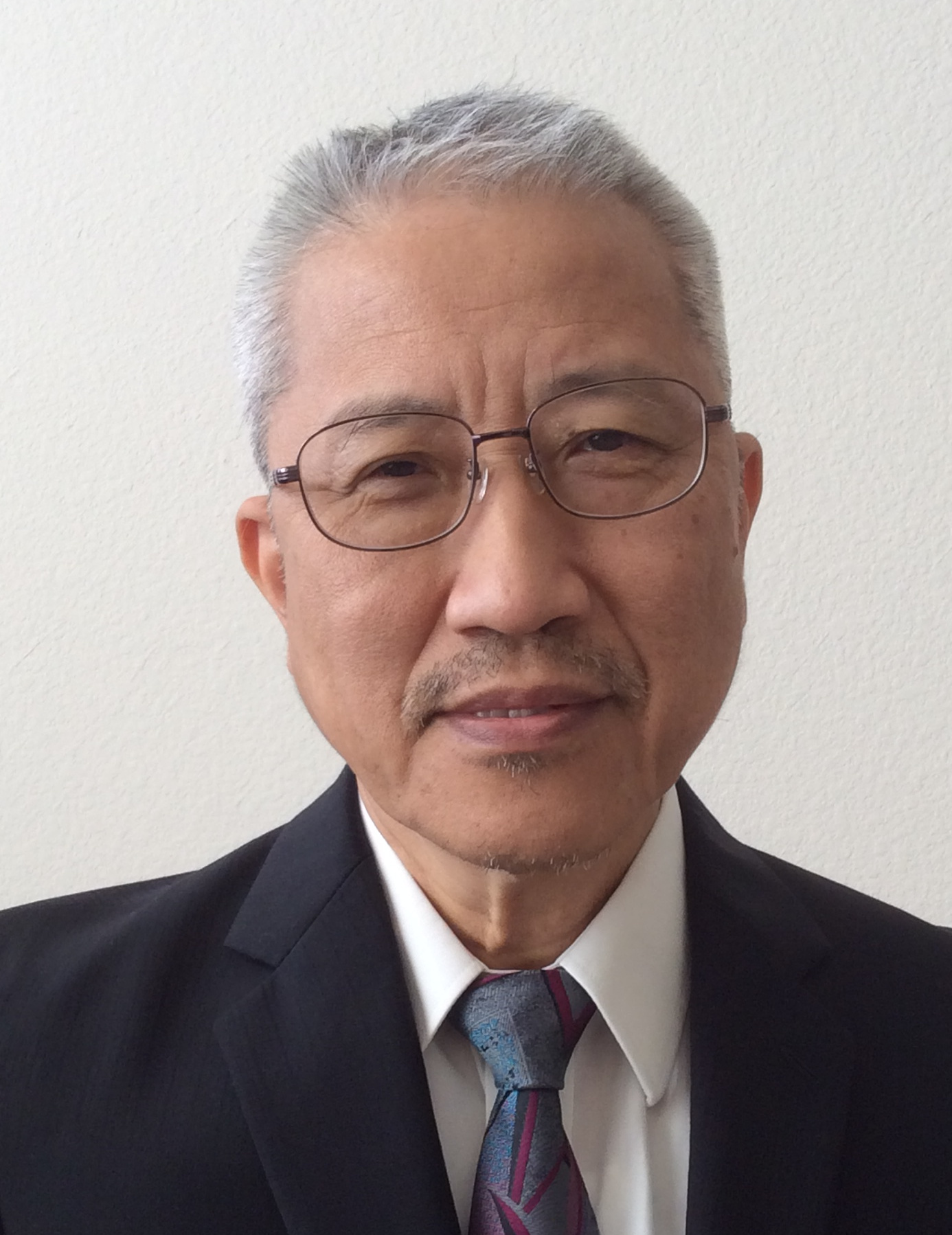
Professor H. Anthony CHAN, IEEE Fellow
Both BSc (Honors) in Artificial Intelligence and BSc (Honors) in Digital Entertainment Technology are in fast growth areas with many jobs and career options. Students will be equipped with fundamentals in computing and information science, and will learn AI or design from basic concepts, technologies, and applications in many fields. The expertise of our staff spans diverse and important areas including machine learning, deep learning, digital entertainment, multimedia, data science, design, Internet, communication network, standards, and ICT industry. Being active in research in these areas, our staff pay attention to ease of understanding and care for students in teaching.
Computing and information technologies are the enables to become a professional to innovate, create and design new and more useful products and services to improve human. New technologies in artificial intelligence, multimedia, virtual reality, and cloud have arisen, and newer technologies will continue to emerge. It is interesting to acquire and appreciate such new knowledge with opportunities to innovate as such a professional in demand globally.
I have enjoyed such an exciting career myself, having worked in both industry and academia overseas and having changed area of expertise multiple times as needs in industry changes. I intend to nurture students with understanding of the industry and with capability to take up new challenges to contribute to the society professionally and ethically.
My motto: I do not possess anything; all I have is only borrowed from God so that I may serve others.

The program objectives are:

(a) As more and more companies are investing in AI technology during this global race in AI efforts and adoption, the current global shortage of AI talents is increasing. This programme takes a newer approach:
(b) The programme is delivered by staff experienced both in the industry and academia.
(c) The programme is supported with a ‘distributed AI laboratory’ for interdisciplinary research and education, which is being established with IDS funding under RGC.
(d) This laboratory is accessible by all schools of SFU, to encourage horizontal developments of AI research and education across such areas as health sciences, business and hospitality management, social services, creative industries and humanities where the Institute has expertise in place.

Upon successful completion of the Program, students should be able to:

The current lack of AI expertise is accounting for the soar in AI wages. In China, while experienced (3-5 years) AI leaders salaries are typically US$150,000 per year , starting positions for AI graduates ranges almost US$50,000-100,000 per year.
The shortage of AI workforce results from many companies adopting AI technology. On the other hand, comprehensive AI education had not yet begun at the bachelor level until 2018. Lacking bachelor scale formal AI education, some competent individuals have been learning on their own to acquire AI experience in AI project at work or with (PhD) thesis research. Companies in China has to offer well over US$100,000 per year to attract these professionals.
The jobsDB job search website is showing hundreds of AI/ML jobs per month.
Example jobs include:

Admission for the BSc(Hons)AI and BSc(Hons)DET in the School of Computing and Information Sciences (CIS), Saint Francis University, Hong Kong(SFU), is open to all internatinal students. With the high demand for admission placements, qualified international students are given special considerations and equal opportunities.
Generally, the applicant should have successfully completed high school education in a 12-grade school system (also known as secondary school or upper/senior secondary school in some countries). It will include basic STEM courses and sufficient preparation in English proficiency to enable study in this degree program with lectures taught in English. Performance based on school transcript will be evaluated individually.
Applicant should meet (1) the English proficiency requirement and (2) the minimum requirement in any of the following examination:
| Examination | Minimum Requirements | |
|---|---|---|
| 1 | Joint Entrance Examination (JEE) | Second Tier grade |
| 2 | General Certificate of Education (GCE) Advanced Level (AL) | Grade E or Above in 3 A-level subjects |
| 3 | GCE Advanced Level (AL) plus General Certificate of Education (GCE) Ordinary Level (O/L) |
Grade E or Above in 2 A-level subjects plus five (5) passes in GCE-OL/GCSE/IGCSE |
| 4 | Scholastic Aptitude Test (SAT) Plus High School Transcript | (a) A combined score of 1,650 (2400-point scale), OR (b) 1,190 (new 1600-point scale) in SAT Reasoning Test Plus High School Transcripts |
| 5 | ACT plus High School Transcript | A composite of 22 in ACT, plus Higher School Transcript |
| 6 | International Baccalaureate Diploma (IBD) | International Baccalaureate Diploma OR equivalent |

International applicants should meet the minimum requirements in any of the following national Examinations:
| Examination | Minimum Requirements | |
|---|---|---|
| 1 | General Certificate of Education (GCE) Advanced Level (AL) or GCE AS-level English Language | Grade E |
| 2 | General Certificate of Education (GCE) (O/L) /GCSE/ IGCSE English Language | Grade C |
| 3 | English Language Test in Joint Entrance Examination (JEE) | A score of 100 (out of 150) |
| 4 | International English Language Test System (IELTS) | An overall score of 5.5 |
| 5 | Test of English as a Foreign Language (TOEFL) | A score of 79 in TOEFL internet-based test Or 213 in computer-based test or 550 in paper-based test. |
| 6 | Scholastic Aptitude Test (SAT) | Level 8 in SAT Reasoning Test Essay or Have obtained an equivalent qualification. |
| 7 | International Baccalaureate (IB) English Language | Level 4 |

Facing the huge demand of AI expertise, an applicant who has completed associate degree program in information and communication technologies (ICT) may apply for admission at Year 3 entry. In additional, with the fast changes in ICT one who has completed associate degree or bachelor degree in ICT areas may apply for admission at Year 3 entry to learn and obtain credentials in AI to upgrade one's career path.
An applicant with related bachelor degree programme may obtain credit transfer for nearly all Year 1 / Year 2 and many more Year 3 / Year 4 courses in recognition of their prior learning experience.
An applicants holding related Associate degree programme qualifications may obtain credit transfer from most Year 1 / Year 2 courses only and may typically start their studies at Year 3 of the BScAI Programme.
One may also complete the AI courses without meeting BScAI requirements to receive certificate in AI instead.
Applicant may also need to meet English proficiency requirement.
NOTE: Such candidates are required to submit photocopies of their certificates and transcripts during application and present the original of same during registration upon successful admission.

Applicants holding the following qualifications can obtain credit transfer from some Year 1 / Year 2 courses in recognition of their prior experience through the granting of advanced standing upon admission, and may typically start their studies at Year 2 of the BScDET Programme:
Applicant may also need to meet English proficiency requirement.
NOTE: Such candidates are required to submit photocopies of their certificates and transcripts during application and present the original of same during registration upon successful admission.

Applying to SFU to study AI or DET is an easy process. We promptly respond to all applications within the shortest possible time
Applications can be submitted online via the Institute/College Online Application System, please refer to:Online Application System.
Shortlisted applicants will be invited to attend an admission interview. Please upload the following documents to the Institute/College Online Application System Online Application System, while submitting the online application:

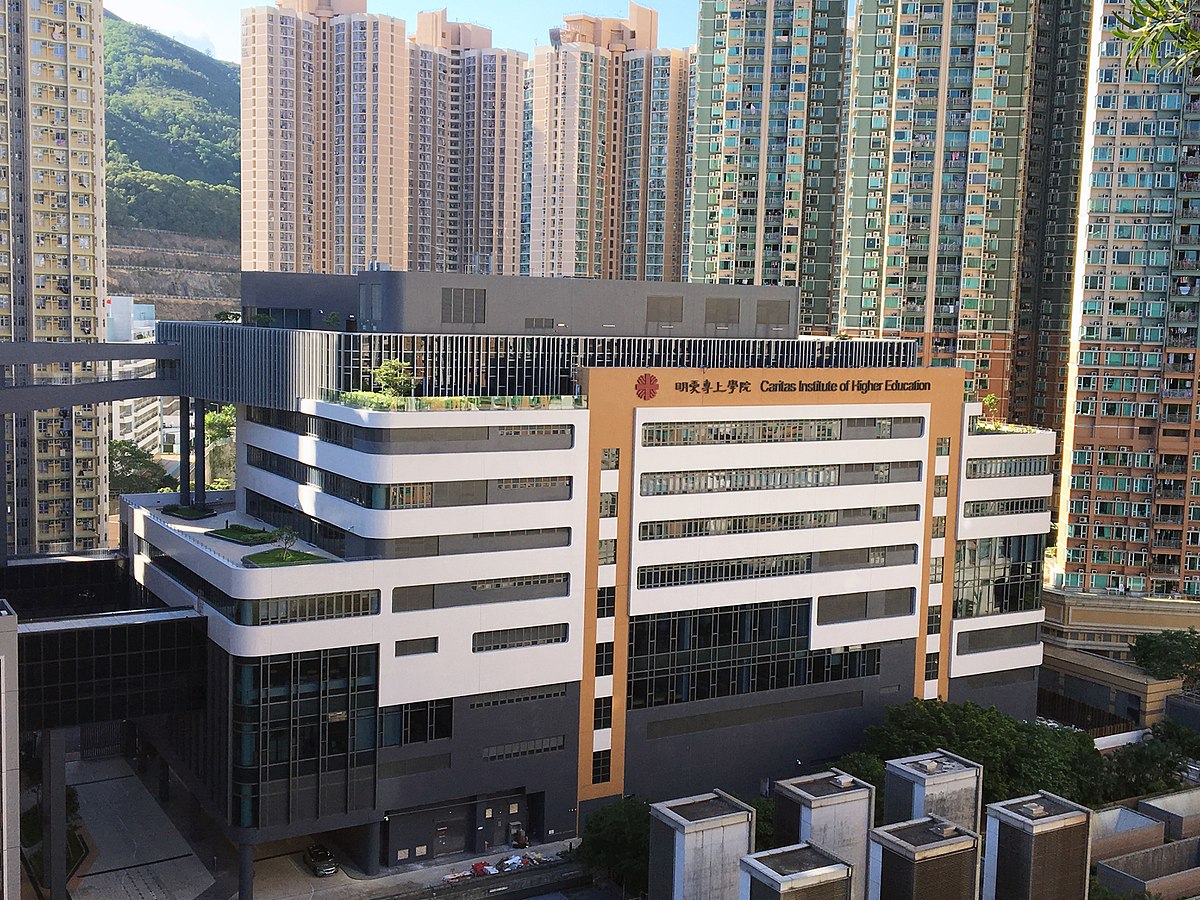
The annual non-local student tuition fee for the 2020-21 intake of the 4-year BScAI (or BScDET) programme is HK$96,310. (Exchange rate: HK$7.78 = US$1)
The international students scholarship is currently available in BScDET and BScAI programme.

The processing of your Hong Kong student visa is currently carried out by Saint Francis University (SFU), upon submission of the required documents to the Registry.
Once your tuition/fees are paid and your registration is completed, Registry will request from you, the relevant documents for student visa processing
Any change to the current arrangement will be communicated to the prospective students
For details of the application process of Student Visa/Entry Permit, please visit the Hong Kong Immigration Department website Student Visa

You may book your one-way or return ticket directly with any airline transiting your country and Hong Kong. You can also book through travel Agents such as TRIP.COM
Please study the Covid-19 guidelines provided by the Department of Health, specifically, visit this link: Inbound Travel before the travel.

It is required that you obtain your Hong Kong ID within the first 3-4 weeks of your arrival in Hong Kong. Note that without the Hong Kong ID, securing accommodation, opening of Bank Account, accessing medical facilities, etc, may be difficult
You can book for your ID immediately you arrive your quarantine hotel. To do so, simply following the steps below:
Your landing page will be Appointment booking for Hong Kong Smart Identity Card
Click "Online appontment booking for Hong Kong identity card application and form filling" Online Appointment booking for Identity Card Application
Select: “Make Appointment” and fill in your details accordingly. It is advisable that you make a note of your appointment date and time and report about 30 minutes before the scheduled time.
Usually your international passport and proof of address. For proof of address, you can use the address of your quarantine hotel during online booking.

Limited spaces are available for international students at the hostels under SFU.
Getting a suitable accommodation can be challenging sometimes, however, using online housing advertisement Agents can lessen your burden
The following links can help in your search for accommodation. They can also be installed on your mobile devices as Apps:
While you intensify your search for accommodation during your quarantine period, you may need to stay in hotel/guest house for few days after completing your quarantine. This arrangement will allow you the opportunity to make the best choice of accommodation
These hotels/guest houses are usually cheaper than the quarantine designated hotels (about HK$200/day or more), especially if you book through agents such as Trip.com, Agoda, and others not isted here
NOTE: In some instances, you may have to make online payment for hotel/guest house, while others will allow you pay at the reception desk. For your permanent accommodation, do not pay for any accommodation you have not sighted or sign a lease agreement for.

You can open and operate bank account in Hong Kong with almost no initial deposit provided you present the required documents.
Basically, most Hong Kong Banks; Bank of China Hong Kong, HSBC, Hang Seng Bank, etc; will request the following documents for account opening:
Once your bank account is setup, you can request the banks to set up e-banking services and ATM card for future use.


Go through the link to select your preferred vaccine, vaccination venue, including date and time
Complete the online booking using your Hong Kong ID. You might need to set a reminder for date and time of vaccination. Note that booking for COVID-19 test also applies

REMINDER to always contact your level advisers when in doubt.

Office Telephone: (852) 3702 4211
WhatsApp: (852) 5269 3846
Email: cis-info@sfu.edu.hk
WeChat ID: wxid_ohv675ayadso52
Office Telephone: (852) 3702 4388
Email: pao@sfu.edu.hk
2 Chui Ling Lane, Tseung Kwan O, N.T. (Exit B, Tiu Keng Leng MTR Station)

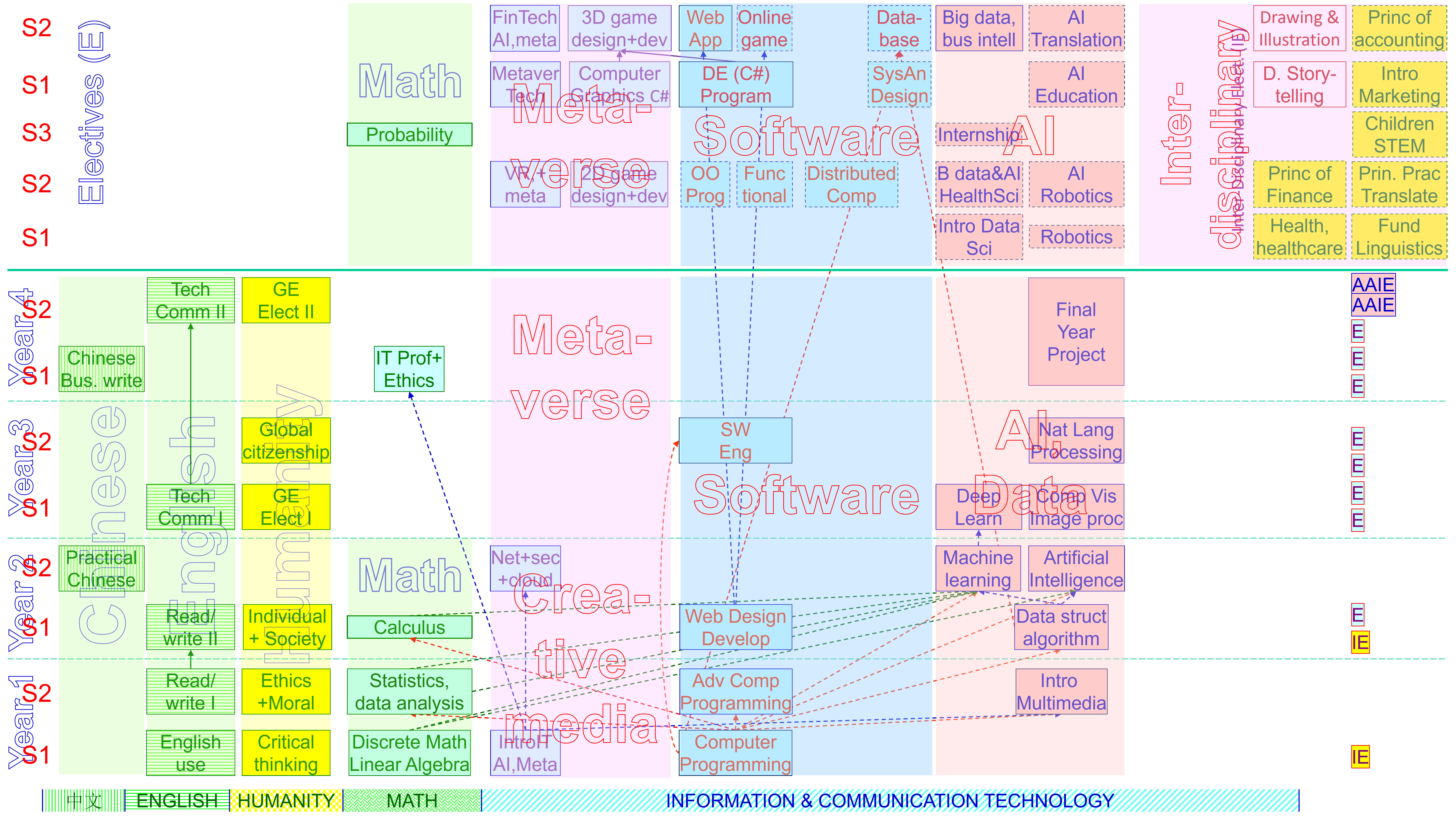
Note: Non-Chinese speaking international student may have Chinese courses substituted by other courses.


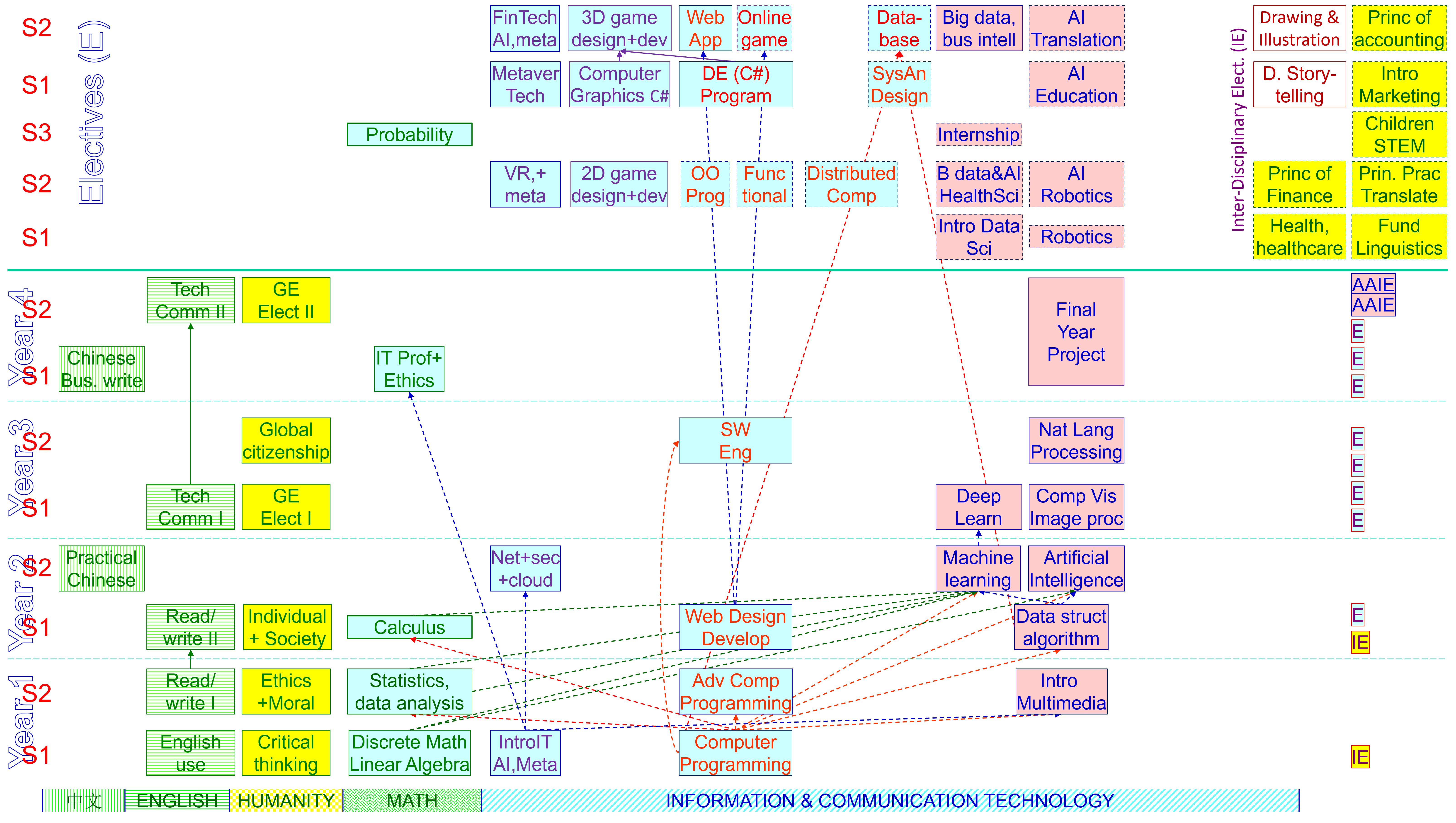
Note: Non-Chinese speaking international student may have Chinese courses substituted by other courses.

The following is an example curriculum for student who already had bachelor degree in Computer Science
Level 4 and 5 courses in Math/IT/AI are exempted on a course by course basis depending on whether an equivalent course had already been successfully completed in the bachelor or associate degree. Curriculum for specific student therefore will depend on relevance of prior courses.
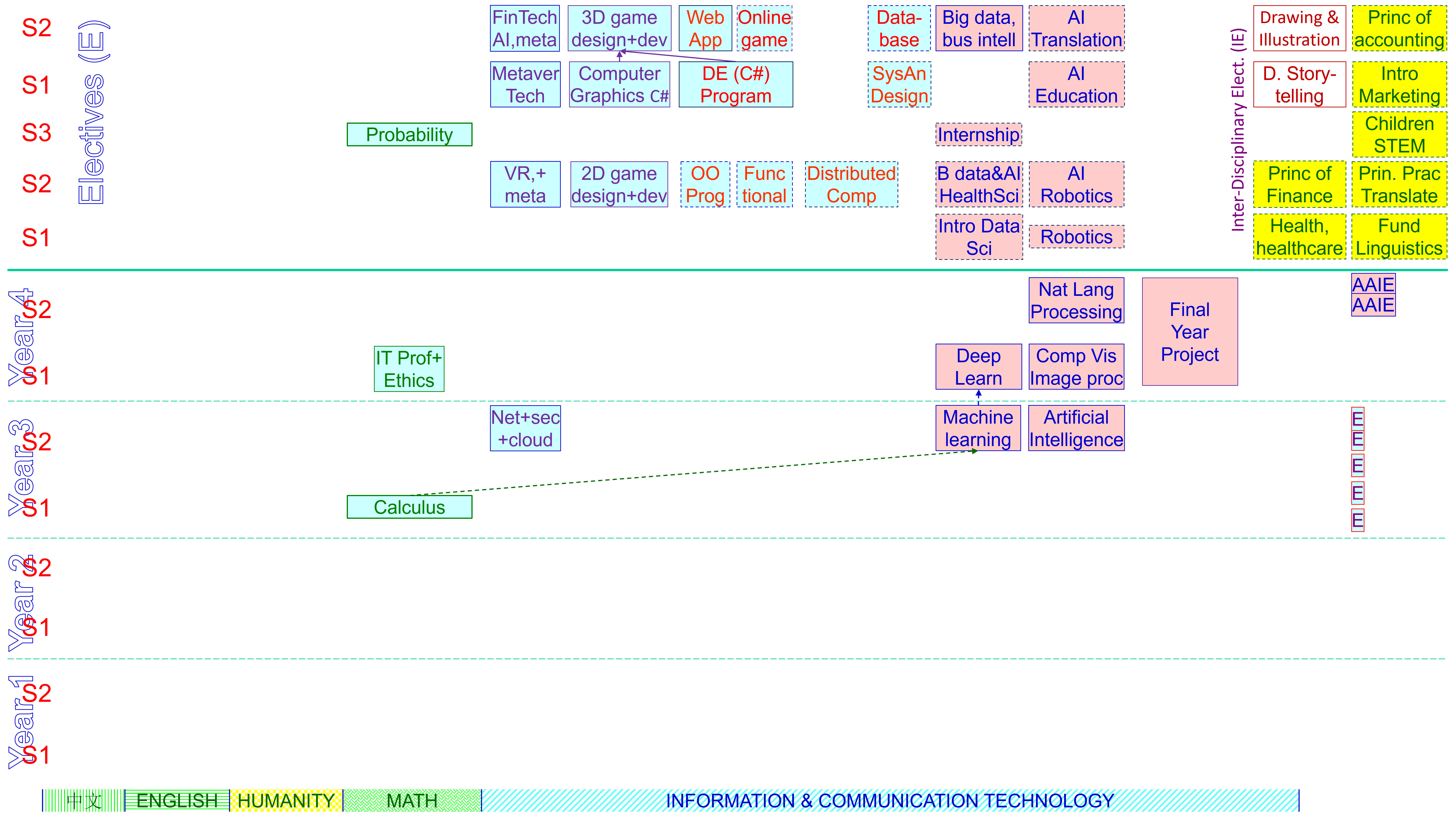
Note: Non-Chinese speaking international student may have Chinese courses substituted by other courses.

The following is an example curriculum for student with 2-year associate degree or higher diploma in Computer Science
Level 4 courses in Math/IT/AI are exempted on a course by course basis depending on whether an equivalent course had already been successfully completed in the associate degree. Curriculum for specific student therefore will depend on relevance of prior courses.
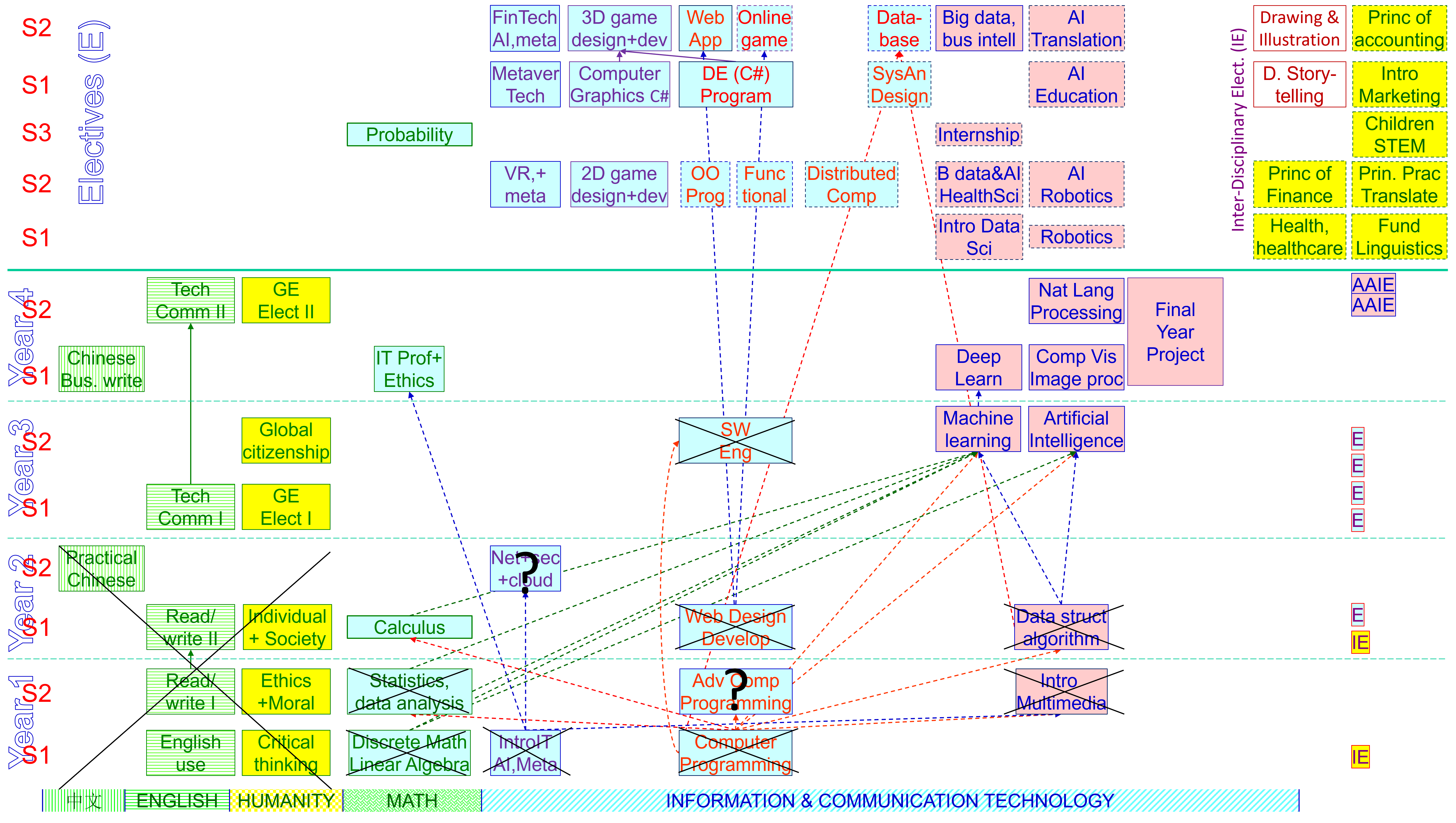
Note: Non-Chinese speaking international student may have Chinese courses substituted by other courses.

The following is an example curriculum for student with a 2-year associate degree or higher diploma in an unrelated discipline.
One may then make up for level 4 maths and computer science courses in Year 2.
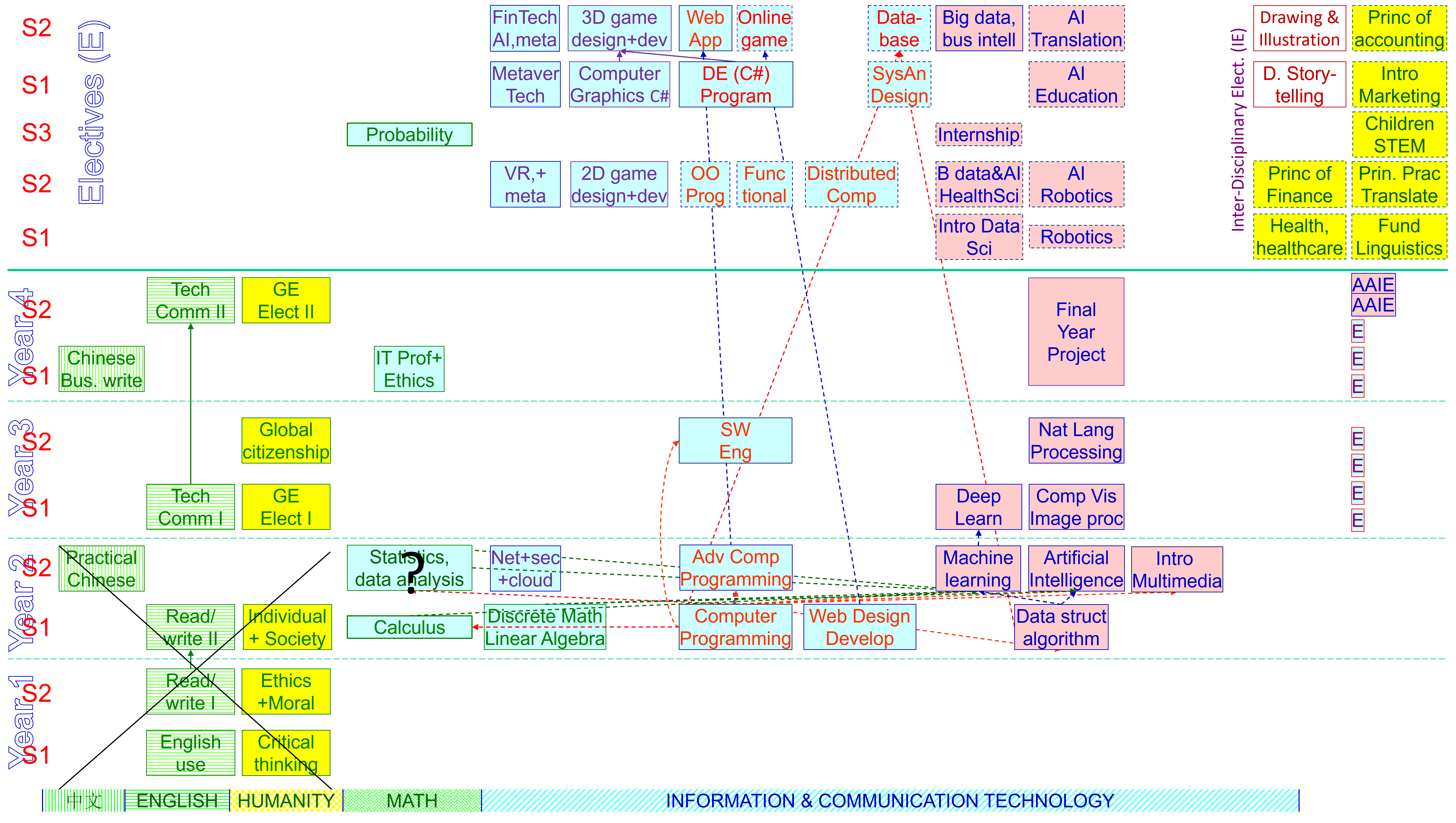
Note: Non-Chinese speaking international student may have Chinese courses substituted by other courses.

The School has good connection with the industry to support the students to spend a period of time at a company to gain industry experiences. Participation in internship is encouraged but is optional.

In 2018, Carnegie Mellon University offered the first B.S. in AI in USA.
In 2019, HKU and CUHK offered the first bachelor in AI programmes in Hong Kong, whereas HK Polyu offered a stream in financial technology and AI:
BEng in Artificial Intelligence - Systems & Technologies
BSc(Hons) in Financial Technology and Artificial Intelligence
They are also listed at: AI programmes listed under Office of the Government Chief Information Officer
In 2020, we are the first Catholic Institution to offer BScAI.
Prior to that, we had begun "Establishment of Distributed AI Laboratory for Interdisciplinary Research," and are the first privately funded higher education institute that has received UGC - IDS funding to establish AI research lab.
Some bachelor AI programmes are listed at: Global bachelor degrees in AI

What is the job prospect of BScAI students? Which industry can I work in?
Machine learning engineer/analyst, big data engineer, systems analyst, software architect, software engineer, front/back end engineer, computing graphic developer/engineer. Machine learning for finance, healthcare, translation, education, or engineering company/organizations. Good knowledge and skills in AI puts one at great advantage in seeking above jobs, in getting higher pay and faster promotion.
What is the market demand for AI specialists?
According to the local job search website in July 2021, there are as many as 1,069 AI-related vacancies in just one month.
If I do not meet the basic admission requirements, will I still be enable to study this bachelor degree programme?
Students could study other related HD/AD programmes and apply for Year-3 entry of BScAI programme when they graduate from those HD/AD.
Do I have a higher chance of admission in the BScAI programme if I have studied ICT? Does ICT have a higher weighting than other electives e.g. Economy?
In the selection process, the applicant's scores in two elective subjects will be considered as additional scores. Although prior study in ICT may help, other factors such as interview, motivation and interests of the applicant are also considered.
I have already complete HD/AD, BSc or BA, can I apply for BScAI?
One who has already complete HD/AD in related area (Computer science, IT, etc.) may apply for Year 3 entry. If the HD/AD is not in related area, one may apply for Year 2 entry.
What are the characteristics and features of the BScAI programme when few universities are offering this programme in the world?
As the first artificial intelligence (AI) degree course offered by a self-financing institution in Hong Kong, we have a Distributed AI Laboratory. The course design is from simple to deep, step-by-step, and qualified liberal arts/science students can apply.
Would it be difficult to understand the contents if I have never studied and contacted any related topics or knowledge?
No. When we design the programme, we do not require that the students have studied any related topics or knowledge.
What are the course contents of the BScAI programme? What skills can we learn?
The BScAI programme has covered both artificial intelligence and information science, including the popular courses like machine learning and deep learning. Using the AI skilled learned in this programme. Graduates could develop various AI applications in different areas.
Can I study other courses other than the courses of BScAI if I have interest in other industries?
AI is already applied in almost every other field. Students will choose 2 interdisciplinary subjects in the first two year. Then in the fourth year, they choose 2 application areas to apply AI to those areas such as finance, translation, healthcare, education, and engineering.
Would the school have any support e.g. related equipment and software for the BScAI students to complete their project?
The school is equiped with AI laboratory and Digital Entertainment laboratory. The laboratories are open to students to enable using them to complete homework and projects.
Does the school help the BASI students buy the expensive professional softwares for their personal use?
The school has established AI laboratory and installed the needed software. Students may use the lab facilities without having to buy their own.
Do BScAI students have internship opputurnities in technological or digital companies?
Yes, we encourage students to intern at Year 3 summer. Our school also has connections with various IT and AI companies, and will recommend students to intern at these companies.
What are the qualifications of the academic staff of the BScAI programme?
The teaching faculty is composed of both local and international experts in AI, ICT, and 5G, including some staff with rich industry experience and Fellows of IEEE
